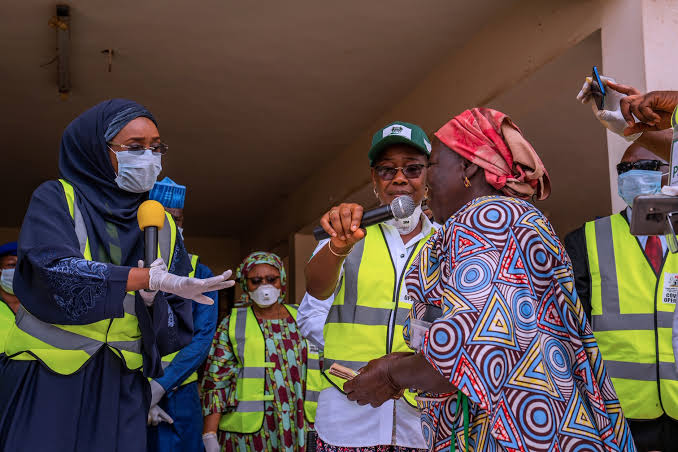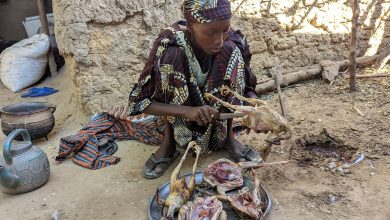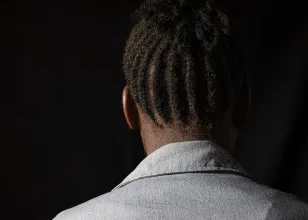COVID-19: Criticism Trails Federal Government’s Assistance Of Underprivileged Persons

Millions of Nigerians have been rendered unemployed by the COVID-19 pandemic and the restriction of movements that has unavoidably followed it.
The situation has impoverished more people.
To cushion the effects of the economic inactivity on the vulnerable, the federal government has started taking steps, including providing relief materials, loan repayment moratoriums and cash transfers to the poor.
The disbursement of 20,000 Naira to indigent households under the Conditional Cash Transfer programme, for instance, was launched in Kwali, Abuja, on Tuesday, April 1.
Usually, beneficiaries are paid 10,000 Naira every two but with the COVID-19 outbreak, the government decided to pay recipients two tranches at once.
At the launching ceremony, a huge stack of 500 Naira notes was placed on a table while middle-aged women with identity cards hanging on their necks stood in a queue to receive their shares.
But some Nigerians have complained about the cash not getting to them, raising questions as to the sharing method.
Recent reports from the Household Uplifting Programme (HUP), which executes the cash transfer, show that beneficiaries are also receiving cash in Adamawa, Ekiti, Anambra, Bauchi, Kogi, Nasarawa, Plateau, Rivers, Sokoto states, and others.
The nature of the cash distribution is especially strange considering that Special Adviser to the President on Social Investments, Maryam Uwais, said a year ago that every payment under the scheme is done through the beneficiaries bank accounts “so we are able to track every kobo spent”.
The National Cash Transfer Office (NCTO) also states on its website that it has adopted an electronic end-to-end payment to ensure that a “trail of cash transfers is established” and to strengthen transparency and efficiency.
Beneficiaries are drawn from Nigeria’s National Social Register (NSR) which is said to be filled using a poverty map that prioritises certain regions and by allowing various communities to identify members most eligible for enrolment.
As of March 31, the register contained details of a little over 11 million Nigerians and 2.6 million poor and vulnerable households across 453 local government areas.
According to the minister of humanitarian affairs, Sadiya Umar Farouk, all 11 million will be receiving money to help them through the pandemic.
‘80 percent of money is wasted’
One of the prominent critics of the cash transfer scheme is Oyo State Governor, Seyi Makinde, who on Monday said he had discovered that the bulk of the money did not get to its intended beneficiaries.
“I have never been impressed for one day by how they’ve identified the poorest of the poor and the impact,” he said in an interview.
“I have done a little bit of work on it in terms of gathering intelligence, finding out if this money is actually getting to the people that require it.
“Part of my findings are that no, close to 80 percent of that money is wasted and 20 per cent that actually gets to some form of individuals is too little and too meagre to have the desired impact. That is my own finding,” the governor said.
Like Makinde, Senate President Ahmad Lawan and Femi Gbajabiamila, speaker of the house of representatives, have expressed dissatisfaction in how the government’s Social Investment Programme (SIP) is implemented during the pandemic as well as doubt about its effectiveness.
Various comments on social media also reflect huge suspicion from Nigerians about the palliative programme.
“Nigerian government officials and taking pictures. See how that money looks plenty on the table, that’s just a few millions. Now imagine all the billions they have stolen in their accounts,” Joshua Hermans-E (@joshuahermansE) tweeted on Wednesday.
Racheal Scott-Ifeanyi (@somarai) also asked on the platform why the government was not using Bank Verification Numbers instead since it would make it easier to trace people’s accounts.
Dunu Anselem (@dunua) wrote, “Cash transaction? Very convenient so as to leave no traces. Federal government cannot direct those earmarked to open bank accounts. You people don’t rate us at all, I don’t blame you, I curse those that helped you pirates to invade us.”
The National Coordinator of the National Social Safety Nets Coordinating Office, Iorwa Apera, has, however, said the agency was doing its best to ensure that the programme “is not only transparent but that we are accounting for every single kobo”.
He said the social register would be expanded to include the urban poor such as low-income earners who had been made vulnerable as a result of the pandemic.
“The structure is there. We have deployed already in every state not only personnel but also hand-held devices that can cover the entire state,” Apera said.
“I can guarantee that every single Nigerian that falls into vulnerability as a result of this pandemic will be captured as far and as much as possible. We have a strategy in place to do that.”
Can we learn anything from other countries?
Nigeria’s Presidential Task Force on Coronavirus at a recent press briefing emphasised the need for the country to learn from the experiences of others, especially China, about how they were tackling the pandemic.
But it would seem the country also has many lessons to learn.
The Canadian government, for example, has developed a comprehensive blueprint titled the “COVID-19 Economic Response Plan”, which provides support for various types of people of groups.
These include individuals and families, people facing unemployment, people who are sick or in self-isolation, people who are unable to work, senior citizens, students and recent graduates, businesses, industries, and so on.
The United States government created a platform where citizens can easily track what is being done by various ministries to help make life easier for them during the crisis.
The country has also approved a two trillion dollar economic stimulus package that will see hundreds of billions of dollars paid directly to citizens and also given as small business loans,unemployment insurance benefits, and loans for distressed companies.
Japan is likewise about to roll out a stimulus package of nearly one trillion dollars to cushion the effect of the virus and Singapore has, in total, spent 41.7 billion dollars for the same reason.
In Nigeria, on the other hand, there does not seem to be any fund specially created to alleviate the hardship encountered by the citizens, especially the 96 million people living in abject poverty. Rather, it has restructured pre-existing social welfare programmes for that purpose.
The Ghanaian government is considering implementing a Coronavirus Alleviation Programme with the aim of protecting livelihoods, supporting small and medium-scale businesses (SMEs), and minimizing job losses.
The president, Nana Addo, has also directed the government to absorb water bills for all citizens for the next three months while also ensuring uninterrupted power supply.
South Africa has released billions of Rands in relief for various sectors, including SMEs, hospitality and tourism, healthcare, agriculture, and so on.
An “SME Support Intervention” will be providing debt relief and a business growth/resilience facility to various small businesses to mitigate the impact of the economic stagnation.
Like in Nigeria, government-sponsored relief items in Rwanda are distributed to households identified by committees formed at the grassroots level. But unlike in Nigeria, reports suggest that extra precaution is taken in the country to prevent crowding and a possible exposure to the virus through a focus on door-to-door delivery.
Support Our Journalism
There are millions of ordinary people affected by conflict in Africa whose stories are missing in the mainstream media. HumAngle is determined to tell those challenging and under-reported stories, hoping that the people impacted by these conflicts will find the safety and security they deserve.
To ensure that we continue to provide public service coverage, we have a small favour to ask you. We want you to be part of our journalistic endeavour by contributing a token to us.
Your donation will further promote a robust, free, and independent media.
Donate HereStay Closer To The Stories That Matter




